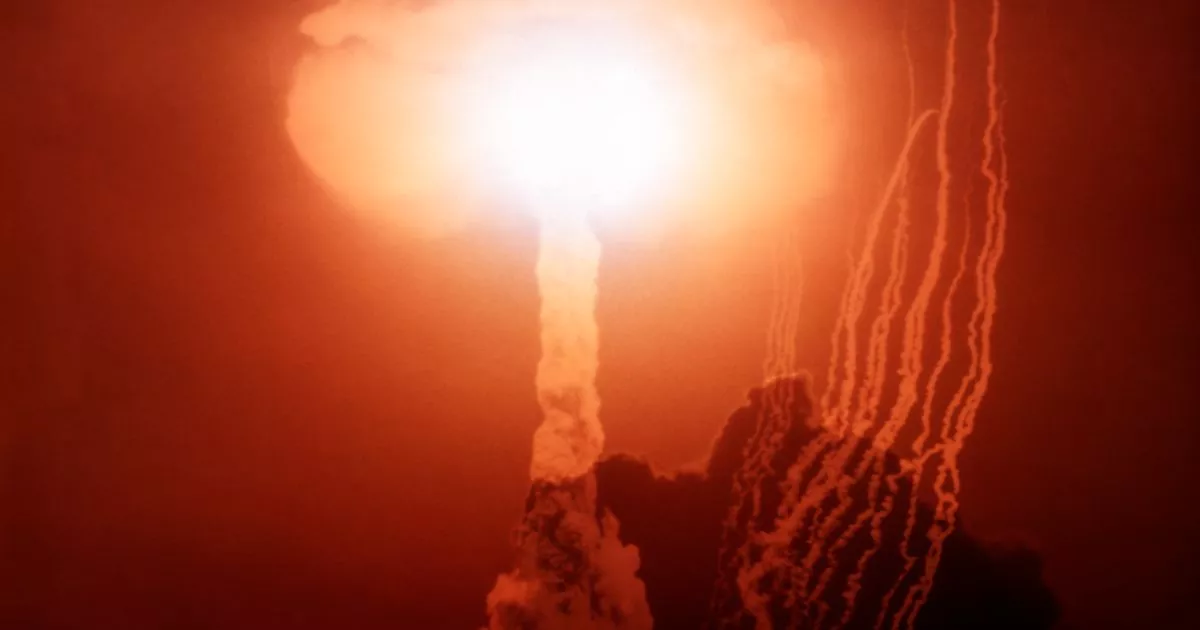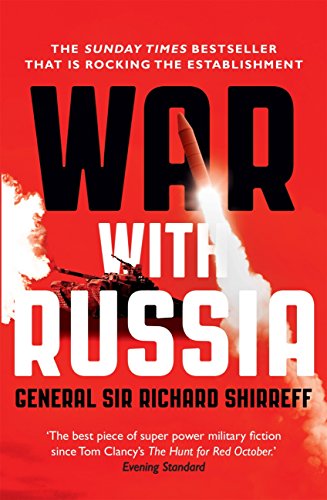Sikirimimimasikini
JF-Expert Member
- Dec 27, 2019
- 2,919
- 15,604
Profesa Andrew Futter, mhadhiri na mtafiti mwandamizi ktk maswala ya silaha za nyuklia Chuo kikuu cha Leicester, Uingereza, amehojiwa na chombo cha habari MyLondon kuhusu linakuwaje kuwaje shambulio la silaha za kinyuklia ktk mji, na namna gani laweza kudhibitiwa. Profesa Futter akawapigia mfano mbaya (Mungu aepushe) ili waelewe nini kitatokea endapo ikitokea Russia karusha kombora la silaha za nyuklia kwenda Uingereza.
Profesa Futter akasema jambo la kwanza kufahamu ni kuwa kimsingi London hatuna kinga dhidi ya silaha za nyuklia. Hatuna mifumo ya ulinzi wa anga ya kudungua makombora ya balistiki kama yakirushwa na Russia kuja UK.
Profesa Futter akaendelea kusema kuwa hata mifumo ya Ulinzi wa anga ya US na NATO iliyopo ktk base ya kijeshi ya Filingdales kaskazini ya Yorkshire hitaweza kuzuia makombora ya nyuklia toka Russia kwa sababu makombora ya Russia huwa yanakuwa na mfumo wa kutoa makombora dada (countermeasures) ya kuyashambulia makombora yatumwayo na mifumo ya ulinzi wa anga kuyatungua (makombora ya Russia).
Profesa Futter akaendelea kusema kuwa ikitokea kurushwa kombora la silaha ya nyuklia toka Russia tutakuwa na dakika 15 za kujiandaa kujibu shambulizi. Muda huo hautatutosha kufanya chochote kiuhalisia. Maofisa wa serikali watakuwa salama, kwani kuna sehemu zao maalumu za kujificha na kuwakinga na silaha za nyuklia.
Profesa Futter akaendelea kuelezea kuwa Russia inaweza kutuma silaha za nyuklia kwa njia tofauti tofauti zikiwemo kutumia madege maalumu ya kivita (bomber aircraft), nyambizi (submarines) na makombora (missiles). Hivyo shambulio la Russia laweza kuja toka ktk locations nyingi. Wakirusha shambulio toka sehemu ya Kaliningrad, iliyopo juu ya Poland, inaweza kuchukua takribani dakika 20 tu kufika kutua London.
Profesa akaendelea kusema kuwa Makombora ya nyuklia ya Russia yatasababisha maafa makubwa mno kwa sababu vichwa vyake (warheads) vina uzito mkubwa zaidi (kilotani 100 hadi 500) kuliko makombora ya nyuklia yaliyotumika ktk vita ya pili ya Dunia (kilotani 15 hadi 20). Kombora moja la uzani wa kilotani 15 hadi 20 lililotumika ktk vita ya pili ya Dunia liliua takribani watu 200,000. Matokeo ya kombora la Russia yatakuwa mabaya zaidi kulinganishwa na matokeo yaliyoonekana Nagasaki na Hiroshima.
======
March 1, 2022
By Josia Mortimer
Russian President Vladimir Putin is stepping up his rhetoric against the West, putting his nuclear arsenal on “special alert” over the weekend. His dangerous language has made the unlikely prospect of a nuclear attack on NATO allies - including the UK - slightly more likely.
But while the prospect of Vladimir Putin targeting London remains highly remote, what would a nuclear attack on the capital look like and how could it be mitigated? MyLondon spoke to Professor Andrew Futter, a senior University of Leicester academic and leading nuclear weapons expert. He took us through some (worst case) scenarios of Russia attack Britain, just so we’re prepared.
The first and most terrifying lesson is that Prof Futter said: “We aren’t protected, basically." He added: “We don’t have any way to intercept Russian ballistic missiles flying towards the UK.
"We might be able to block bomber aircraft, but much of the Russian nuclear arsenal is based on missiles. We would see missiles coming, we have satellites in North Yorkshire and access to US and NATO early warning systems.”
Filingdales, a base in North Yorkshire, sees the UK play host to a US radar missile defence system, which has the ability to track but not intercept missiles. “The nascent US and NATO missile defence systems would have some capability against launches from the Middle East but not Russia,” Prof Futter says.
While Ronald Reagan’s dream of a “Star Wars” space-based missile defence system never came to full fruition, the US does have a ballistic missile defence system with a site in Europe. But here’s the bad news from Prof Futter who said: “It has virtually zero capability against Russian missiles that can deploy countermeasures.” In other words, some of Russia’s nuclear weapons can strike down missiles that are trying to stop them. Bombs bombing bombs, essentially.
The theory is that anyone attacking the UK would run the risk of retaliation and any rational leader wouldn’t do it. And NATO is a nuclear alliance, so any attack on the UK would “almost certainly” involve the US.
But a nuclear deterrent only works if the other person plays the game. Prof Futter continued: “None of us have a crystal ball, but I don't see a nuclear attack on the UK being likely. It would an enormous escalation and suicidal. Putin said he’d raise the alert status, it’s not clear what that means. He has strategic weapons that are on alert already."
The impact of a nuclear strike depends on how many weapons are used, the size of the “yield” or explosive power, and where they are detonated. It’s clear that any attack would be “pretty horrible”, Prof Futter says. “It wouldn’t take many nuclear weapons to destroy the UK as a functioning state," he added.
The two nuclear bombs used in the Second World War were around 15-20 kilotons each, leading to approximately 200,000 people dying. Most Russian warheads are believed to be at least 100kt, with some up to 500kt. “Hiroshima and Nagasaki would be insignificant in comparison,” says Prof Futter.
What would this do to London? The short and obvious answer to this is that a strike on this scale would destroy most of the capital, and kill hundreds of thousands of people. But there are two ways of dropping a nuke.
An “air burst” would see the bomb detonate over the city, which would cover a greater area but with less of an impact (though still enormous). Or Putin might target a missile silo, detonating on the ground with less geographical spread but a greater direct impact. Depending on the size of the blast, it would cover several square miles.
The scale of potential damage is best expressed by this graphic from Nuke Map, based on Google Maps and modelling of a 100 kiloton Russian nuke striking London’s centre.
The inner ring shows that a 100 kiloton "air burst" attack over the Strand would have a fireball radius of 380m. Anything inside that central orange ring would be vaporised, and basically anyone within the green zone would die, NukeMap analysts say. Meanwhile, most buildings would collapse in the next ring, wiping out most of the City of London, Westminster, Mayfair, Elephant and Castle and northern Lambeth.
“It’s not just the amount of things you destroy, it’s the fact you have mass panic, hospitals destroyed, transport doesn’t work, food system is disrupted, information blackout, no access to clean water or power. You have no government, no financial sector. All the things that happened with Covid in the first lockdown would be magnified many times," Prof Futter says.
Instead, his nuclear rhetoric is a signal to NATO to do nothing, given there’s a sword of Damocles hanging over Western countries’ heads. So, should we be worried? “We should be concerned, but there isn’t an obvious way of doing anything different soon. We put our eggs in the basket of nuclear deterrence.” Let’s hope Putin isn’t a fan of eggs.
A government spokesperson would not respond to these questions directly, but told MyLondon: “As the Prime Minister has said, Russia’s actions are an attempt to distract from the reality of what is going on in Ukraine.
“What we are seeing is innocent people facing a totally unprovoked act of aggression against them, and in response they’re fighting back with a far greater level of resistance than the Kremlin had bargained for.”

 www.mylondon.news
www.mylondon.news
Profesa Futter akasema jambo la kwanza kufahamu ni kuwa kimsingi London hatuna kinga dhidi ya silaha za nyuklia. Hatuna mifumo ya ulinzi wa anga ya kudungua makombora ya balistiki kama yakirushwa na Russia kuja UK.
Profesa Futter akaendelea kusema kuwa hata mifumo ya Ulinzi wa anga ya US na NATO iliyopo ktk base ya kijeshi ya Filingdales kaskazini ya Yorkshire hitaweza kuzuia makombora ya nyuklia toka Russia kwa sababu makombora ya Russia huwa yanakuwa na mfumo wa kutoa makombora dada (countermeasures) ya kuyashambulia makombora yatumwayo na mifumo ya ulinzi wa anga kuyatungua (makombora ya Russia).
Profesa Futter akaendelea kusema kuwa ikitokea kurushwa kombora la silaha ya nyuklia toka Russia tutakuwa na dakika 15 za kujiandaa kujibu shambulizi. Muda huo hautatutosha kufanya chochote kiuhalisia. Maofisa wa serikali watakuwa salama, kwani kuna sehemu zao maalumu za kujificha na kuwakinga na silaha za nyuklia.
Profesa Futter akaendelea kuelezea kuwa Russia inaweza kutuma silaha za nyuklia kwa njia tofauti tofauti zikiwemo kutumia madege maalumu ya kivita (bomber aircraft), nyambizi (submarines) na makombora (missiles). Hivyo shambulio la Russia laweza kuja toka ktk locations nyingi. Wakirusha shambulio toka sehemu ya Kaliningrad, iliyopo juu ya Poland, inaweza kuchukua takribani dakika 20 tu kufika kutua London.
Profesa akaendelea kusema kuwa Makombora ya nyuklia ya Russia yatasababisha maafa makubwa mno kwa sababu vichwa vyake (warheads) vina uzito mkubwa zaidi (kilotani 100 hadi 500) kuliko makombora ya nyuklia yaliyotumika ktk vita ya pili ya Dunia (kilotani 15 hadi 20). Kombora moja la uzani wa kilotani 15 hadi 20 lililotumika ktk vita ya pili ya Dunia liliua takribani watu 200,000. Matokeo ya kombora la Russia yatakuwa mabaya zaidi kulinganishwa na matokeo yaliyoonekana Nagasaki na Hiroshima.
======
March 1, 2022
By Josia Mortimer
Russian President Vladimir Putin is stepping up his rhetoric against the West, putting his nuclear arsenal on “special alert” over the weekend. His dangerous language has made the unlikely prospect of a nuclear attack on NATO allies - including the UK - slightly more likely.
But while the prospect of Vladimir Putin targeting London remains highly remote, what would a nuclear attack on the capital look like and how could it be mitigated? MyLondon spoke to Professor Andrew Futter, a senior University of Leicester academic and leading nuclear weapons expert. He took us through some (worst case) scenarios of Russia attack Britain, just so we’re prepared.
The first and most terrifying lesson is that Prof Futter said: “We aren’t protected, basically." He added: “We don’t have any way to intercept Russian ballistic missiles flying towards the UK.
"We might be able to block bomber aircraft, but much of the Russian nuclear arsenal is based on missiles. We would see missiles coming, we have satellites in North Yorkshire and access to US and NATO early warning systems.”
Can we defend ourselves?
All this would give us about 15 minutes to prepare for a nuclear strike. Prof Futter added: “It wouldn’t give us time to do anything. Government officials might be ok, there is a bunker under Whitehall and some places VIPs can hide.” I wasn’t particularly reassured on hearing this.Filingdales, a base in North Yorkshire, sees the UK play host to a US radar missile defence system, which has the ability to track but not intercept missiles. “The nascent US and NATO missile defence systems would have some capability against launches from the Middle East but not Russia,” Prof Futter says.
While Ronald Reagan’s dream of a “Star Wars” space-based missile defence system never came to full fruition, the US does have a ballistic missile defence system with a site in Europe. But here’s the bad news from Prof Futter who said: “It has virtually zero capability against Russian missiles that can deploy countermeasures.” In other words, some of Russia’s nuclear weapons can strike down missiles that are trying to stop them. Bombs bombing bombs, essentially.
Why aren’t we protected?
We know that the US has the ability to intercept some nuclear strikes. Britain, on the whole, does not. Why? “One of the reasons is because of a belief in the deterrent value of nuclear weapons, because we believe our Trident system, based on submarines, would be very hard to attack,” Prof Futter says.The theory is that anyone attacking the UK would run the risk of retaliation and any rational leader wouldn’t do it. And NATO is a nuclear alliance, so any attack on the UK would “almost certainly” involve the US.
But a nuclear deterrent only works if the other person plays the game. Prof Futter continued: “None of us have a crystal ball, but I don't see a nuclear attack on the UK being likely. It would an enormous escalation and suicidal. Putin said he’d raise the alert status, it’s not clear what that means. He has strategic weapons that are on alert already."
Where would a nuclear strike come from - and what would it do?
Russia could deploys nuclear weapons in a number of ways - including bomber aircraft, submarines and missiles as part of a “strategic triad” of military kit. So any attack could come from a number of locations. Firing from Kaliningrad, just above Poland, however, wouldn’t take very long - roughly 20 minutes from launch before it would strike London.The impact of a nuclear strike depends on how many weapons are used, the size of the “yield” or explosive power, and where they are detonated. It’s clear that any attack would be “pretty horrible”, Prof Futter says. “It wouldn’t take many nuclear weapons to destroy the UK as a functioning state," he added.
The two nuclear bombs used in the Second World War were around 15-20 kilotons each, leading to approximately 200,000 people dying. Most Russian warheads are believed to be at least 100kt, with some up to 500kt. “Hiroshima and Nagasaki would be insignificant in comparison,” says Prof Futter.
What would this do to London? The short and obvious answer to this is that a strike on this scale would destroy most of the capital, and kill hundreds of thousands of people. But there are two ways of dropping a nuke.
An “air burst” would see the bomb detonate over the city, which would cover a greater area but with less of an impact (though still enormous). Or Putin might target a missile silo, detonating on the ground with less geographical spread but a greater direct impact. Depending on the size of the blast, it would cover several square miles.
The scale of potential damage is best expressed by this graphic from Nuke Map, based on Google Maps and modelling of a 100 kiloton Russian nuke striking London’s centre.
The inner ring shows that a 100 kiloton "air burst" attack over the Strand would have a fireball radius of 380m. Anything inside that central orange ring would be vaporised, and basically anyone within the green zone would die, NukeMap analysts say. Meanwhile, most buildings would collapse in the next ring, wiping out most of the City of London, Westminster, Mayfair, Elephant and Castle and northern Lambeth.
“It’s not just the amount of things you destroy, it’s the fact you have mass panic, hospitals destroyed, transport doesn’t work, food system is disrupted, information blackout, no access to clean water or power. You have no government, no financial sector. All the things that happened with Covid in the first lockdown would be magnified many times," Prof Futter says.
Threat level
More likely than an attack on the UK, there is a chance that Russian short-range tactical nuclear weapons might be used against troops or military installations along the NATO Belarus/Ukraine border, Prof Futter says. But that too remains a remote prospect, radiation and fallout would likely impact Russia and Russian supporters in Ukraine, which wouldn’t do Putin any favours.Instead, his nuclear rhetoric is a signal to NATO to do nothing, given there’s a sword of Damocles hanging over Western countries’ heads. So, should we be worried? “We should be concerned, but there isn’t an obvious way of doing anything different soon. We put our eggs in the basket of nuclear deterrence.” Let’s hope Putin isn’t a fan of eggs.
A government spokesperson would not respond to these questions directly, but told MyLondon: “As the Prime Minister has said, Russia’s actions are an attempt to distract from the reality of what is going on in Ukraine.
“What we are seeing is innocent people facing a totally unprovoked act of aggression against them, and in response they’re fighting back with a far greater level of resistance than the Kremlin had bargained for.”

Amount of time nuclear weapons would take to reach London from Russia
It's not likely, but it's good to know these things




